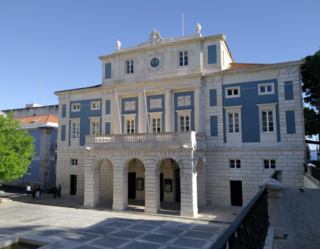
The Teatro Nacional de São Carlos is an opera house in Lisbon, Portugal. It was opened on June 30, 1793 by Queen Maria I as a replacement for the Tejo Opera House, which was destroyed in the 1755 Lisbon earthquake. The theatre is located in the historical center of Lisbon, in the Chiado district.

The Garrett Theatre is a theatre located at Rua José Malgueira Street in Junqueira quarter, Póvoa de Varzim, Portugal which is often referred simply as Garrett. It is one of the historic theatres of Portugal, and some of the best performers of Portuguese, Brazilian and Spanish drama staged there, including Ary Fontoura, João Villaret, Laura Alves, Procópio Ferreira, and Ruy de Carvalho. Orchestras, tunas, variety shows, political meetings were also common in Garrett history.
The following is a timeline of the history of the city of Lisbon, Portugal.

Laura Alves was a Portuguese actress on stage, film and radio.

The Teatro Variedades was a theatre in Lisbon, capital of Portugal, that offered variety or revue shows of the type known in Portugal as Teatro de Revista. Opened in 1926, it has not been used since 1992, but as of 2020 there were active plans to construct a new theatre on the site, incorporating elements of the existing building.
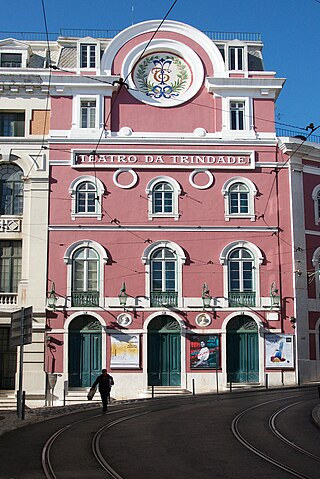
The Teatro da Trindade is a theatre in the Chiado neighbourhood of Lisbon, Portugal, built in the 19th century. It is one of the oldest theatres in Lisbon still in operation.
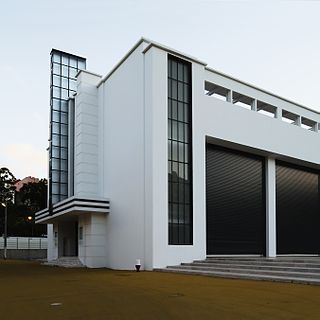
The Teatro Capitólio, officially called Cineteatro Capitólio - Teatro Raul Solnado, is located in Parque Mayer, in Lisbon, Portugal. It was opened in 1931. Because of its early modernist design it has been recognized as the first building of the Modern movement in Portugal and was declared a "Building of Public Interest" in 1983. Suffering from water damage, the theatre was closed in the 1980s and only finally reopened in November 2016 after extensive restoration.
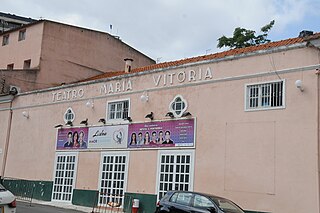
The Teatro Maria Vitória is a theatre in Lisbon, capital of Portugal. It is located in the theatre district of Parque Mayer.
Teatro Ádóque was a theatre and theatrical cooperative located in the Martim Moniz area of Lisbon, capital of Portugal.

Parque Mayer is a theatrical and entertainment district in the Portuguese capital of Lisbon. Originally created as a summer amusement park, it at one time had four theatres, although one was demolished in 2015 and another has not been used since 1992. Successive proposals have been made for upgrading the area, but none has yet come to fruition.
Francisco Nicholson was a Portuguese actor, director, playwright, songwriter and screenwriter. He was a co-founder of the Teatro Ádóque theatre cooperative. He wrote, directed, and acted in revues and was a writer of television soap operas, among many other accomplishments.

The Teatro da Rua dos Condes, or simply Condes, was a theatre in the Portuguese capital of Lisbon. It was opened in 1738 and rebuilt in 1755 after an earthquake. Never considered comfortable, it was demolished and rebuilt in 1888 and eventually converted to a cinema. After a further demolition and reconstruction as a purpose-built cinema, the building now houses a Hard Rock Café. For part of its life the Teatro da Rua dos Condes was one of Lisbon's major theatres, attracting the city's elite, including the royal family. However, with the construction of newer, more modern theatres it gradually moved from offering operas and legitimate theater to vaudeville and revues with more of a mass appeal.

The Teatro do Ginásio was a theatre in Lisbon, Portugal that mainly concentrated on performances of comedy shows.

Teatro do Salitre was one of the first theatres in Lisbon, capital of Portugal. It opened on 27 November 1782, changed its name to Teatro de Variedades in 1858, and was demolished in 1879. For much of its existence it was one of the two leading theatres in Lisbon, together with the Teatro da Rua dos Condes. Lisbon also had the Teatro Nacional de São Carlos, which was mainly dedicated to opera. The Salitre was situated close to the area that later became Lisbon's theatre district, known as Parque Mayer.

The Teatro D. Fernando was a theatre in the Portuguese capital of Lisbon between 1849 and 1860.

The Teatro Apolo, initially called Teatro do Príncipe Real, was a theatre in the Portuguese capital of Lisbon, opened in 1866. It was named in honour of the future King Dom Carlos when he was just three years old. In 1910, with the fall of the monarchy, its name was changed to Teatro Apolo. In 1957 the theatre was demolished.

The Teatro Tivoli is a theatre located on the Avenida da Liberdade, in the Portuguese capital of Lisbon. It is also used as a cinema. The theatre, which celebrated its 100th anniversary in 2024, is presently known as the Teatro Tivoli BBVA as a result of sponsorship by the Banco Bilbao Vizcaya Argentaria. The Tivoli has 1149 seats and has been classified as a Monument of Public Interest since 2015.

Anita Guerreiro is a Portuguese actress and fado singer.
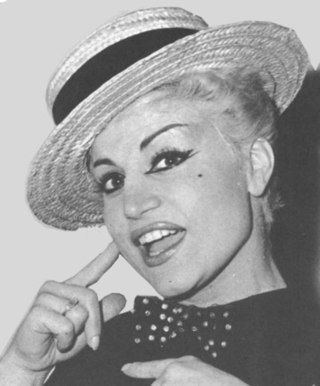
Maria Ivone da Silva Nunes, better known as Ivone Silva, was a Portuguese actress. She became famous for her humorous work on television and in revues.
















